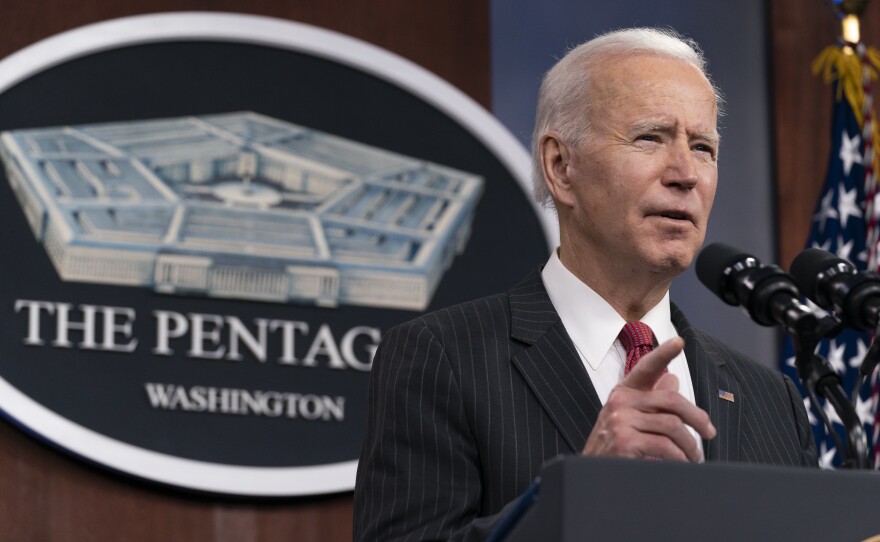Updated April 14, 2021 at 1:15 PM ET
The United States will withdraw all remaining troops from Afghanistan by the 20th anniversary of the Sept. 11 attacks, President Biden will announce Wednesday, turning the page on a conflict that has cost trillions of dollars and the lives of more than 2,300 American troops.
"We went to Afghanistan because of a horrific attack that happened 20 years ago. That cannot explain why we should remain there in 2021," Biden is expected to say, according to excerpts released by the White House. He will say the U.S. cannot continue "hoping to create the ideal conditions for our withdrawal, expecting a different result."
The withdrawal of U.S. troops will represents the most consequential military decision that Biden has made since taking office, and will complete a process that began under the Obama administration, starting with a drawdown from a peak of more than 100,000 U.S. service members in the country in 2011. It's a decision that makes good on a campaign pledge to end "forever wars," but carries significant political and national security risks if Afghanistan backslides into a haven for terrorists intent on attacking the United States, a concern raised even by Biden's Democratic allies in Congress.
Watch Biden's remarks live beginning at 2:15 p.m. ET.
As of 2021, some 2,500 U.S. troops remain in Afghanistan. As many as 1,000 more special operations forces are also reported to be in the country. Biden is expected to say the U.S. will continue diplomatic and humanitarian work in the country, including assistance to the Afghan National Defense and Security Forces.
Biden's predecessor, former President Donald Trump, had pledged to the Taliban a full withdrawal of U.S. troops by May 1, which Biden had previously said would be "tough" to meet.
A senior administration official told reporters on Tuesday that the withdrawal would not be conditions-based, as Biden had deemed such an approach "a recipe for staying in Afghanistan forever."
Some U.S. personnel will remain in the country, which the administration official said would be necessary to protect America's diplomatic presence in the country.
News of the president's planned withdrawal has drawn stinging rebukes from leading Republicans in Congress. Addressing reporters on Wednesday, Rep. Liz Cheney of Wyoming, the No. 3 Republican in the House, called it "fundamentally dangerous."
"Any withdrawal of forces that is not based on conditions on the ground puts American security at risk," Cheney said. "He's further, apparently, going to announce that the date for the withdrawal will be Sept. 11. Now I'm not sure why the White House has selected that date, but I can tell you that that is a huge victory, huge propaganda victory, for the Taliban, for al-Qaida."
Senate Minority Leader Mitch McConnell, R-Ky., called the plan "a grave mistake."
"It is a retreat in the face of an enemy," McConnell said from the Senate floor on Tuesday. "Foreign terrorists will not leave the United States alone simply because our politicians have grown tired of taking the fight to them."
Among Democrats, the plan has exposed long-simmering rifts in the party about the American presence in Afghanistan. Some have cheered the plan, with progressives such as Sen. Elizabeth Warren, D-Mass., saying the decision shows, "President Biden recognizes the reality that our continued presence there does not make the U.S. or the world safer."
Others have been far more critical.
"Withdrawal of U.S. troops must be based on the facts on the ground, not arbitrary deadlines," Sen. Maggie Hassan, D-N.H., tweeted. "After all that our service members have sacrificed, we must ensure that Afghanistan does not once again become a safe haven for terrorists who seek to harm America."
The announcement comes as months of U.S.-brokered peace talks between the Taliban and Afghan government have thus far failed to lead to any significant breakthrough. In a tweet ahead of Biden's remarks, Afghan President Ashraf Ghani said he had spoken with Biden and that the country "respects the U.S. decision and we will work with our U.S. partners to ensure a smooth transition."
The White House said the president will visit Section 60 at Arlington National Cemetery following the speech, where U.S. service members killed in Afghanistan and Iraq are buried.
Copyright 2021 NPR. To see more, visit https://www.npr.org.







